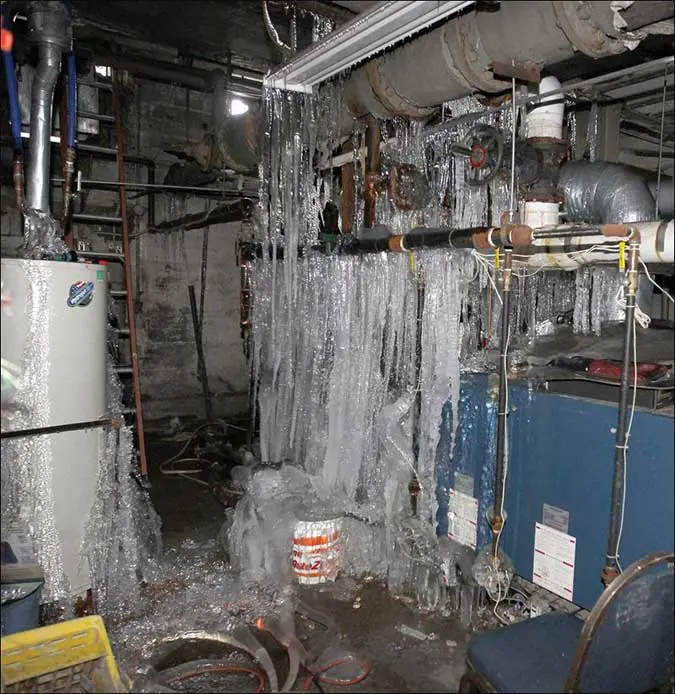 207-885-0771
207-885-0771Our harsh winters can bring on extreme cold, making reliable heating essential for safety, comfort, and preventing frozen pipes.
Everyone! Regardless of how newly built or well insulated, no home is safe if left with no heat during below freezing temperatures. After just hours of extreme cold, people can die from hypothermia and plumbing pipes can freeze. Frozen pipes cause catastrophic damage to homes, resulting in very costly repairs and loss of irreplaceable valuables.

Those that travel for work, leave for weekend visits or winter recreation, and certainly anyone who goes away for winter vacations are the most vulnerable. If your home is left uninhabited for long periods of time, you could lose heat and not be aware of it until it is too late.
Even new homes with brand new heat systems can have faulty parts, failures with control devices, control boards, and safety sensors and switches. Often, these parts need to be ordered and shipped. Even if shipped over-night, that’s a couple days before you are up and running. New parts under warranty can also take a day or two for the warranty claim process to go through.
Heat pumps are now often used as primary heat sources. This can be great much of the year, but presents a serious risk during sub-zero temperatures, or during heavy snow or rain conditions. Much of the control boards and electrical systems are housed in the outdoor unit of a heat pump. These systems can’t get wet, so depending on weather conditions, we may have to wait until weather improves before we can complete repairs.
Depending on temperatures and insulation, houses and their contents can freeze in less than 24 hours. Once a house freezes, heating and domestic water pipes freeze which leads to breaks that result in water leaks when the pipe thaws. It doesn’t take much water to create damage inside homes. Structural damage, wood rot and mold growth, and other building materials damage happen quickly. Frozen pipes usually lead to insurance claims, insurance adjuster inspections for evaluations, estimates and approvals. Then you must find contractors to fix damaged areas, schedule contractors, and bear the inconvenience of all the coordination, interruption to daily life, and lengthy repairs.
Having a backup heat source can be as simple as having an electric baseboard. Yes, they are inefficient and electricity is expensive, but this is not intended to run for a long period of time, just to get you out of an emergency. It’s a lot cheaper than the cost of broken pipes and water damage!

Direct Vent Furnaces are highly efficient and can be installed in a variety of locations, including basements, garages, and additions. At Gelinas, financing one can start at $74 a month for qualified individuals, and the unit installed starts around $3,500.
Heat pumps are great for a backup heat source. Because they heat and also offer air conditioning, they are a 12-month solution for your comfort needs. Heat pumps also save up to 40% on fuel costs because they are so efficient. Optimizing your heat pump by using them during the shoulder seasons and when winter temps are not terribly cold. At Gelinas, financing a heat pump system can start as low as $127 a month for qualified individuals, and the unit installed starts around $6,000.
Wood and pellet stoves are a good backup heat source, and familiar in many Maine homes. The downside is that they need constant attention, so if you are away from home a lot or go on vacation, one probably isn’t the best option as a backup.

The first recommendation to compliment having a backup heat system of some kind is the MOEN Flow Automatic Shutoff and Leak Detectors protection. Installing these products can notify you instantly if your heating system fails and automatically shut the water main off to prevent water damage. The Moen Flo app can notify you if temperatures in your home fall to whatever temperature you choose.

The second recommendation we would make is to have a Honeywell Wi-Fi thermostat installed. Smart thermostats are a not only a good way to manage your heat and energy efficiency, but they can also notify you if your heating system is not operating properly.
As you can see, being prepared with a secondary heat source isn’t just about comfort or for the overly cautious – it’s about safety. Once your heating system fails, it’s a race against the clock to notify your heating service provider and get on their repair schedule before the house freezes up. Investing in a backup heating option ensures that no matter what happens with your primary heating system, the weather, or the power grid, you and your family will stay warm all winter long.